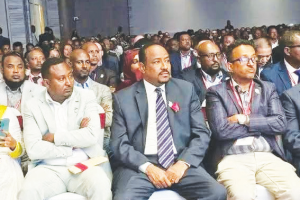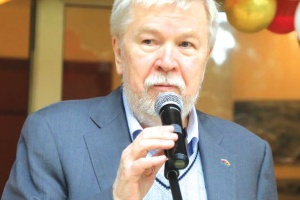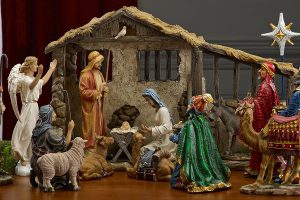Stories can affect human emotions and books can serve as models for development. A book entitled Yemidir Zelalem recently released was authored by Yalew Azanaw Aka (Dibekulu Geta/Pen name). It offers bibliotherapy to those who love poetic thoughts but misfortunately affected by Apeirophobia, which puts readers’ mood on the rollercoaster of pessimism and optimism.
The book precisely articulates that this trauma occurs as a result of the endless conflict between God, devil and man. As a preamble of the book, the author states the idea mentioning that “As part of God’s wish to be eternal he created man. And man did the same by bringing forth art.” But there is also demon that fights for his cachet by enticing man with various booby-traps.
Man is a creature to possess whom both God and devil are equally locked in a fight ignoring his freewill. Hence, if man develops his talent and apply his free will, he can be transfigured into one sat on the driver’s seat of his life. Everything in this world made by a human being could be traced back to artistic and scientific creation. Therefore, the output gained from these profound skills will endure commemorating the name of the doer forever. This is about achieving eternity through one’s deeds in one’s corporeal existence, embodied in the title of the book.
One of the poems of the book given a title in the form of question, exclamation, three dots, two colons (?!…::) features about the meaning of life. The poet raises concerns about why a man aspires to achieve a certain goal in the entirety of his childhood, adulthood and old ages. The verses in this poem clearly show that man is very enthusiastic to imitate others in his early life. Most children try to follow elder’s suit at the utmost of their ability.
At the middle of adulthood, everyone develops self-confidence to do or achieve everything. At this age, overconfidence and ego mounts in human heart considering the limitations and mere desires of childhood. Then old ages draws neigh to take its place where everyone will cool down recognizing one’s agility ebbs out. Therefore, an individual at elderly age will be wiser. He rather prefers to opt out using force to achieve whatever he wants. However throughout his life, man never stops trying to achieve his wishes. He aspires to erect a monumental deed for remembrance before he breathes his last.
This poem tries to define the meaning of life via questions and exclamation marks as well as dots at each stage. Accordingly, the question mark in the poem reveals man’s enthusiasm in his early days to know and test everything. This is about pursuit of wisdom in the heart of anyone especially in childhood through asking everything again and again. Or it may be the inquisitive nature of human beings to know something new until their last day.
Secondly, the exclamation mark represents admiration of nature, beauty, art or other things. It can also be defined as the fresh energy and zeal of man to achieve everything during adulthood. Thirdly, the three dots in this poem indicate man’s walks of life. It can be also human endless thought and wish for success in life. The last but not the least punctuation mark in this poem is double colon (or four points in Amharic writing system) representing a dot in English grammar. It shows the end of a statement or one’s thought. It also denotes the fruits of one’s endeavor in life. Or it can be also taken as the last moment of any human being.
The poem symbolizes life as an event when we abruptly tend to ask about and admire whatever we see, put our opinion and leave in the closure of the event. These are natural sequences that happen in everyone’s life. Then, the poet laments the mortality of man despite his inhibited nature to achieve each of his desires.
However, the poet tries to seek a comfort assuming that even the capability of God is subject to constraint in some conditions. The closing verse of this poem states that hulunseri amlakm fitur yetebale yedagim fetari mewesegna alew, which literally means even the capability of the almighty God is restricted by his own handiwork meaning man. The statement emphasizes man is the replica of God in everything including his inhibited nature. The poet represents the constricted capability of God in three ways. The first point dictates that God is restricted that’s why he couldn’t create a creature better than a human being.
On the other hand, it is God that creates man so that the latter worship him. However man has free will to accept this command or to decline to respect it. Therefore, God’s desire is in the hands of his creature, man. Furthermore, this verse states God is not the sole creator. Any talented person can also create something to leave his footstep behind for others allude to his deed. Especially, a writer can do the same as God via creating characters that have their own free will.
Therefore, the only thing man can do is enjoying life and departing this world by putting his fingerprint as a keepsake or for commemoration. This thought is also analogous to the statement at the preamble of the book “God creates mankind to achieve eternity and man did the same to art.” Both can be recalled or disregarded based on their works, the poem indicates.
In many of his poems, the poet relates the interests of God, demon and man. In the poem entitled ‘yikirta elhalehu’ the poet blames God for bringing him to this strange world where he can’t achieve his wishes by his own. He mentions that God creates man with free will but everything was predetermined.
The poem mystically points out that Adam and Eve were allowed to use free will but their creator knows they will eat the apple and will be evacuated from heaven. Similarly, God creates man with high sensation but binding with law. Whether man obeys the law or break it, God or demon will win. But man has free will, what a tragicomedy! This is a predetermined grievance to man that is why the poet tends to blame God for creating him via yehulet hazen dinkuan poem.
The poet also depicts life from various points of view. The poem entitled hiwot kinif wist dictates the nature of life that will not allow anyone to achieve his all wishes. The poet puts hyphen in a bracket symbolizing that the bracket would never get closed at 360 degree. If this happens, the bracket will lose its name and meaning and the same is true for life. The essence of the poem lies in that life is not full of joy or achievement due to the misfortune of man’s free will usually interrupted by the conflict between God and devil. This thought is also reflected in most of the poems in the book including yehulet hazen dinkuan, cherernet, fikir keteqarno, gets getsun, melkiaseb, sekokawe dibe, mirabna misrak, zigmetelewt among others.
The poem titled gize egir temelash discloses the flying away nature of time and its restarting nature while it is up. The rising of the sun is a symbol that it rushes to set and the horizon is an indication to its rise again in the morning. Therefore, time is like a pendulum swing, nothing new.
Irritated by such nuisance of life, including the socioeconomic situation of his country that make bad days in everyone’s daily routines the poet calls for the assistance of kindhearted individuals or artists to give him relief. His poem maneh mezmur yaleh articulates his belief in artists in making good days happen to anyone especially to the destitute through their artworks, as a morning song (brainworm) rings in one’s head all the day. The poem suggests artistic pieces as a remedy to get cured from trauma induced by killings, tribalism, inferiority complex, dictatorship and other political dominations and economic marginalization under which his country and even the world is currently languishing under.
Therefore, the poet reveals his ambition to create a paradise where his innocent creatures or characters will live peacefully to the solace of readers. The poems entitled kalderesnew alem and fiterat alemen have commonalities with this thought. He believes that a writer especially a poet has a power to create such imaginative world that can entertain readers to ignore their grievances through stunning art pieces. Therefore he has a great respect for poets. That is why he attributes some of his poems including getami Lucifer, baleknew siyafeqir, yagatami neger, tegetamiwna yaw getamiw bicha to poets.
The book draws such thoughts triangularly by connecting the dots between God, demon and man. This triangle also points out man’s free will when the sketch crosses the triangle or when it lies ‘out of the box.’ These chains of ideas tend to convey the message that man should win the fight against the interests of the two powers and ensure his freewill. If man achieves his ambition by applying his talent and freewill, he can make a miracle that can enable him vie even with his creator.
In this regard, the poet constructs comparison between God and poet based on their works. In his poem tilted tegetamiwna yaw getamiw bicha, the poet states that it is only a poet that stands almost equal to God in creating a precise and prudent creature. These are man and poem. Here, poetic elements are supposed to match with the ingredients and form that God uses to create man.
The whole-host of ideas well-penned in the book and spiced by artistic ingredients and best words and sensational expressions titillate the heart of the reader. The poems in the book try lay bare and express human nature and feelings that cannot be easily discerned by the mob. Therefore, the book encodes the harmony of love and beauty in its poems such as yekenfer mahitem, silesua nebere, buna tafelalech, dinber yelesh, manesh, yedimtsua demgibat,among others. Not only this, the poems like sine tsidk and tiyakena mels are also included to reveal man’s critique.
The book, having 202 pages and which entertains the facets of life, bears 194 poems. The price of the book is 125 ETB. Of course, investing money on books is a worthwhile investment, for it is tantamount to broadening one’s horizon when it comes to intelligence, thought and organized thinking. This bent pays back in terms of achieving immortality via one’s achievement that can be passed down to in generations to come even long after the doer passed away. That is why the poet gave to the book the title it Eternity from Corporeal Existence.
The Ethiopian Herald Sunday Edition 17 Novebmer 2019
BY YOHANES JEMANEH




